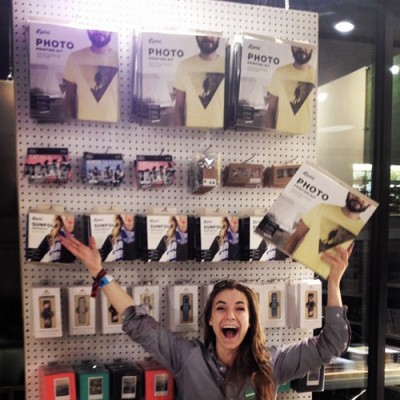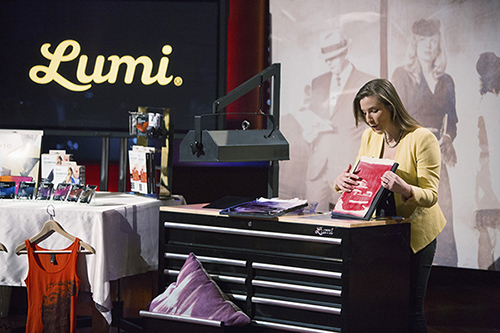When 16-year old Jesse Genet began printing tee shirts in her parents’ basement, the enterprising teen could have scarcely fathomed a future in which her bright idea would morph into Lumi, a company with $2.5 million in sales, which appeared on ABC’s Shark Tank, earned a coveted spot in Silicon Valley’s hottest startup incubator Y Combinator (think Airbnb, reddit, Dropbox) and has just closed on a seed venture round of financing.
Jesse and Lumi business partner Stephan Ango met as Product Design students at Art Center. Before starting college, however, Jesse was a natural-born entrepreneur who sought out a better way to print photography on textiles. A ton of research led her to a reference about a dye process that intrigued her and eventually led her to the man who owned the rights to the dye and the last inventory of the substance. She first contacted him while still in high school. “He didn’t take me seriously at first,” Jesse recalls. “After all I was just a high school kid. It wasn’t until Stephan and I joined forces and we made several trips to Northern California to meet with him that he finally began to negotiate with us seriously.”
Lumi – Print with Light from Lumi on Vimeo.
Ultimately, the duo purchased the rights to the process and the last remaining inventory of the dye and started experimenting with it. They modernized the formula to be more ecologically friendly and in due time created Inkodye, Lumi’s first product. Inkodye is revolutionary because it allows people to print their own images on fabric using the power of sunlight. The process develops in about 10 minutes in direct sun and about 30-40 when it is cloudy outside.
Lumi was initially funded by a Kickstarter campaign—believed to be the first by Art Center students—launched when the crowdfunding site was just five months old. It was named Best Design Project of 2010, successfully raised $13,597 and the company was off and running. A second Lumi Kickstarter campaign raised over $200,000 and allowed Jesse and Stephan to create a full printing process, from wash to dye to iPhone app, and by 2014 the Inkodye process was selling in Urban Outfitters, Michael’s and JoAnn Fabric and Craft Stores.
Last September, Jesse participated in an episode of Shark Tank that aired February 13, 2015, asking the sharks for an investment of $250,000 in return for a 3% equity position in the company. After negotiations that lasted over 90 minutes (only eight minutes made it to air), she turned down the sharks’ final offer of a loan plus equity investment, feeling that the cost was too high.
Undeterred, Jesse and Stephan decided to complete an application to participate in Silicon Valley’s hottest incubator, Y Cominbator, which twice a year invites a number of start-up companies to move to Silicon Valley for a three-month class.
“The application was an amazing exercise in itself,” noted Jesse, “it is very thorough and we actually completed it to help us examine where we were and where we might want to go as a company. After we were done we decided we might as well submit it.” Even though it was after the application deadline, Lumi was accepted into the Y Combinator class that started in January 2015.
Once enrolled, Jesse and Stephan developed and perfected their funding pitches with mentoring and direction from some of Silicon Valley’s superstars. “The experience was very intense,” she said. “YC is trying to continue the Wild West frontier of Silicon Valley where scrappy start-ups get together and feed off each others’ energy.”
Coming out of YC, Lumi has added to its suite of products, incorporating the means to serve the on-demand requirements of business today. It has developed proprietary software that turns any graphic into a vector file that can then be used to create very high quality printed products. With a Lumi toolkit, users aren’t limited to ball caps and t-shirts because they aren’t limited by the product or surface that they’d like to customize.
Lumi recently closed on a seed round of funding from LOWERCASE capital (think Twitter, Uber, Instagram, and Kickstarter) and Homebrew, a VC firm specializing in investing in companies building what they term the ‘Bottom Up Economy’ and whose partners come from the ranks of Twitter, YouTube and Google.
Keep your eyes on Jesse and Stephan. Like their revolutionary product, they seem powered by sunlight and are sure to keep shining.










